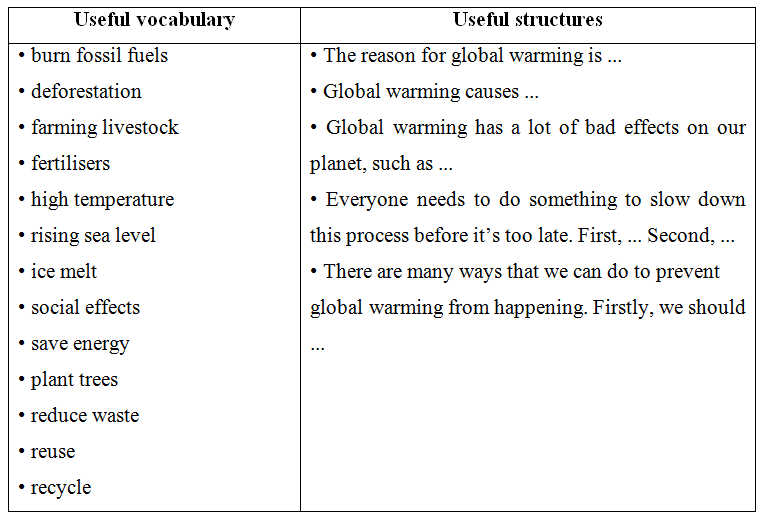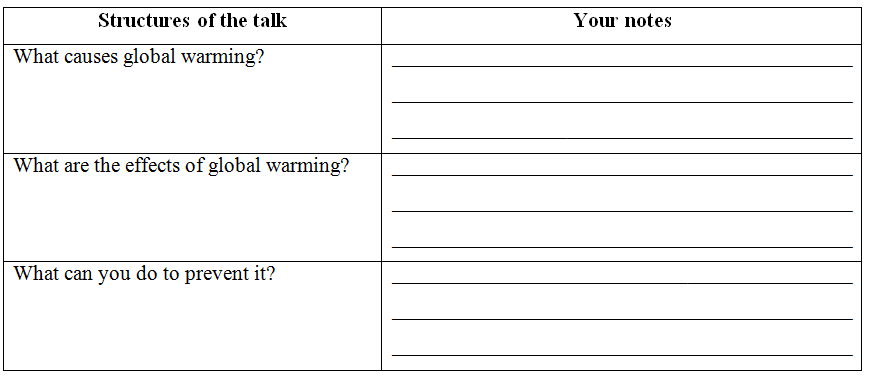Trắc nghiệm Chuyên đề 11 Unit 6. Global warming !!
Câu hỏi 2 :
Choose the best option to complete each of the following sentences.
1. There has been no rain for 3 months in the region. Trees are going to die because of_________.
1. There has been no rain for 3 months in the region. Trees are going to die because of_________.
Câu hỏi 3 :
2. Because CFC may cause ozone depletion, it has been_________globally.
2. Because CFC may cause ozone depletion, it has been_________globally.
Câu hỏi 4 :
3. Water vapour is surprisingly considered a_________gas as it partially makes the Earth warmer.
3. Water vapour is surprisingly considered a_________gas as it partially makes the Earth warmer.
Câu hỏi 5 :
4. _________change can be in the form of hotter summer, longer drought or more hurricanes.
4. _________change can be in the form of hotter summer, longer drought or more hurricanes.
Câu hỏi 6 :
5. The mixture of gases that surrounds the Earth is called_________.
5. The mixture of gases that surrounds the Earth is called_________.
Câu hỏi 7 :
6. All the plants and living creatures in a/an_________have impacts on one another.
6. All the plants and living creatures in a/an_________have impacts on one another.
Câu hỏi 8 :
7. _________floods have happened more regularly recently due to climate change.
7. _________floods have happened more regularly recently due to climate change.
Câu hỏi 9 :
8. Education plays an essential role in raising people’s _________of global warming.
8. Education plays an essential role in raising people’s _________of global warming.
Câu hỏi 10 :
9. Heat_________in the atmosphere by greenhouse gases like CO2 and CH4 makes the Earth warmer.
9. Heat_________in the atmosphere by greenhouse gases like CO2 and CH4 makes the Earth warmer.
Câu hỏi 11 :
10. Laws to prohibit activities causing global warming will be composed by_________.
10. Laws to prohibit activities causing global warming will be composed by_________.
Câu hỏi 13 :
2. The stresses in_________systems threaten extinction of some critically endangered species.
2. The stresses in_________systems threaten extinction of some critically endangered species.
Câu hỏi 14 :
3. Impacts of climate change on plant_________have now been modeled on a regional basis.
3. Impacts of climate change on plant_________have now been modeled on a regional basis.
Câu hỏi 15 :
4. A_________is defined as the total emissions caused by an individual or an organization.
4. A_________is defined as the total emissions caused by an individual or an organization.
Câu hỏi 20 :
2. It is important that_________pay more attention to the problem of global warming. (LAW)
2. It is important that_________pay more attention to the problem of global warming. (LAW)
Câu hỏi 22 :
4. It seems to me that global warming is not the reason of any_________disease at all. (INFECT)
4. It seems to me that global warming is not the reason of any_________disease at all. (INFECT)
Câu hỏi 23 :
5. CO2_________are the main cause of global warming which is dangerous to all on Earth. (EMIT)
5. CO2_________are the main cause of global warming which is dangerous to all on Earth. (EMIT)
Câu hỏi 25 :
2. A: Global warming is the aftermath we have to face because of our unconsciousness.
B: Because of what?
2. A: Global warming is the aftermath we have to face because of our unconsciousness.
B: Because of what?
Câu hỏi 29 :
6. A: Sea level rise caused by global warming will take our land.
B: What will take our land?
6. A: Sea level rise caused by global warming will take our land.
B: What will take our land?
Câu hỏi 62 :
3. He came to the event late. He apologized for that.
→ _________________________________________________________
3. He came to the event late. He apologized for that.
→ _________________________________________________________
Câu hỏi 64 :
2. (inform)___________about the flight delay, he went to the airport later than scheduled.
2. (inform)___________about the flight delay, he went to the airport later than scheduled.
Câu hỏi 65 :
3. (complete) ___________ the work early, he had more time to search for necessary information.
3. (complete) ___________ the work early, he had more time to search for necessary information.
Câu hỏi 66 :
4. (catch) ___________a cold after going swimming, she had to stay in bed and take a rest.
4. (catch) ___________a cold after going swimming, she had to stay in bed and take a rest.
Câu hỏi 71 :
9. (fine) ___________for legal violations several times, Jane was much more careful when driving.
9. (fine) ___________for legal violations several times, Jane was much more careful when driving.
Câu hỏi 78 :
Read the passage and choose the best answer to each of the following questions.
The glaciers of the Himalayas and the Andes could disappear in this century. As a result, the millions of people in India, Bolivia and Peru who now depend on melting water from mountain glaciers could find themselves in a critical situation. The ice sheet of Greenland is also melting more quickly than the scientists predicted. Greenland’s largest outlet glacier, the Jakobshavn Ibra glacier, is moving toward the sea twice as fast as it was in 1995. One cause could be meltwater that runs down to the bottom of the glacier and gets between the ice and the rock below. This water makes it easier for the glacier to slide along to the ocean.
Many ice researchers believe that Greenland’s melting, if it continues, will add at least three feet to global sea levels by the year 2100. If the ice sheet of Antarctica, now largely unaffected, begins to melt, the next few conturies could see a six-foot rise in sea levels, forcing tens of millions of people out of their homes.
(Reading Explorer 2)
1. What was the purpose of the writer in writing this passage?
Read the passage and choose the best answer to each of the following questions.
The glaciers of the Himalayas and the Andes could disappear in this century. As a result, the millions of people in India, Bolivia and Peru who now depend on melting water from mountain glaciers could find themselves in a critical situation. The ice sheet of Greenland is also melting more quickly than the scientists predicted. Greenland’s largest outlet glacier, the Jakobshavn Ibra glacier, is moving toward the sea twice as fast as it was in 1995. One cause could be meltwater that runs down to the bottom of the glacier and gets between the ice and the rock below. This water makes it easier for the glacier to slide along to the ocean.
Many ice researchers believe that Greenland’s melting, if it continues, will add at least three feet to global sea levels by the year 2100. If the ice sheet of Antarctica, now largely unaffected, begins to melt, the next few conturies could see a six-foot rise in sea levels, forcing tens of millions of people out of their homes.
(Reading Explorer 2)
1. What was the purpose of the writer in writing this passage?
A. to explain the problems of melting glaciers
B. to suggest how to slow the melting of glaciers
C. to illustrate how glaciers were formed and disappeared
D. to explain the causes of global warming
Câu hỏi 79 :
2. What do many researchers believe will happen by the year 2100?
2. What do many researchers believe will happen by the year 2100?
A. The ice sheet of Antarctica will begin to melt.
B. Tens of millions of people will be forced out of their homes.
C. The melting of Antartican ice will add six feet to sea levels.
D. Global sea levels will rise at least three feet.
Câu hỏi 80 :
3. What is happening to the ice sheet of Antarctica?
3. What is happening to the ice sheet of Antarctica?
Câu hỏi 81 :
4. What will happen if the Antarctican ice sheet begin to melt?
4. What will happen if the Antarctican ice sheet begin to melt?
Câu hỏi 82 :
5. What is the word “critical” in line 3 closest in meaning to?
5. What is the word “critical” in line 3 closest in meaning to?
Câu hỏi 83 :
Listen to the information about climate change and choose the best option to answer each of the following questions.
1. How fast do average temperatures rise in the Arctic in comparison with elsewhere on earth?
Listen to the information about climate change and choose the best option to answer each of the following questions.
1. How fast do average temperatures rise in the Arctic in comparison with elsewhere on earth?
Câu hỏi 84 :
2. How is our oceans estimated to be by 2100?
2. How is our oceans estimated to be by 2100?
Câu hỏi 85 :
3. Which of the following cities is NOT mentioned as a low-lying area?
3. Which of the following cities is NOT mentioned as a low-lying area?
Câu hỏi 86 :
4. What would happen if we stopped all carbon dioxide emissions tomorrow?
4. What would happen if we stopped all carbon dioxide emissions tomorrow?
Câu hỏi 87 :
5. What can we do to avoid the severe consequences of climate change?
5. What can we do to avoid the severe consequences of climate change?
Lời giải có ở chi tiết câu hỏi nhé! (click chuột vào câu hỏi).
Copyright © 2021 HOCTAPSGK




